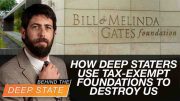
The release of 1,400 pages of e-mails and memos to the conservative organization Judicial Watch has confirmed that the Obama administration’s IRS in Washington singled out Tea Party and “patriot” organizations for delays and extra scrutiny in their applications for non-profit status. Judicial Watch had filed multiple Freedom of Information Act requests to obtain the information.
Washington, D.C.-based IRS official Holly Paz wrote in a March 17, 2010 e-mail to Cincinnati IRS office manager Cindy Thomas, “I think we should take a few more cases (I’d say 2) and would ask that you hold the rest until we get a sense of what the issues may be.” Thomas subsequently wrote in an e-mail to her underlings that Washington had ordered a delay on Tea Party 501(c)4 applications as people in Washington, D.C., examined two applications: “Per Holly’s e-mail directly below, EOT [Exempt Organizations-Technical division of the IRS] does not want all of the tea party cases. They only want 2 of them and want us to hold the remainder. We can discuss who should hold them if you would like. Let me know. Thanks.”
The purpose in delaying 501(c)4 applications of Tea Party organizations was to starve them of funds before elections, as most corporations and foundations will not donate to organizations without an IRS non-profit designation. In short, the delays by the IRS were designed to strangle the then-emergent Tea Party movement financially before it could ever get off the ground.
Paz was later put on long-term administrative leave from the IRS, and her boss — Lois Lerner — was dismissed after asserting her right against self-incrimination under the Fifth Amendment to the U.S. Constitution on the stand in congressional testimony on May 22, 2013.
Though the official IRS Exempt Organizations division BOLO (Be on the Look-out) for Tea Party 501(c)4 applications was withdrawn in 2012, the Judicial Watch documents reveal that Lerner may still have been delaying Tea Party applications as late as a month before her dismissal. Lerner sent an e-mail April 19, 2013 labeled “high” importance to Holly Paz: “By the way — please tell Cindy if they see that application for the [name redacted] should be sent here right away — it needs to be worked here. Meghan and Judy can oversee — they suggested Liz Ardoin might be a good person to develop it.”
The BOLO for “Heightened Awareness Issue” applications for 501(c)4 applications was sent out on July 2, 2010 to Holly Paz in Washington, and said:
Emerging Issue Examples
Tea Party Cases:
1. High Profile Applicants
2. Relevant Subject in Today’s Media
3. Inconsistent Requests for 501(c)(3) and 501(c)(4)
4. Potential for Political/Legislative Activity
5. Rulings Could be Impactful
While the Judicial Watch documents were focused on e-mails sent during several weeks in April 2013, they also included a number of documents related to the IRS targeting of Tea Party applications for 501(c)4 tax-exempt status beginning in 2010, and a busy correspondence between IRS officials in Washington and the staff of Senator Carl Levin (D-Mich.) in 2012 and 2013.
The Judicial Watch revelations come in the wake of a May 7 Washington Times report that “the tax agency audited 10 percent of those donors, much higher than the audit rate for average Americans.
The political Left has fumed over Tea Party applications for 501(c)4 non-profit status in the wake of the 2010 Citizens United Supreme Court decision, as it allows the organizations thus designated to conduct some overtly political activity as long as they are primarily engaged in operations to promote the “social welfare.” Democrats in particular have asserted that 501(c)4 designations for Tea Party groups were simply ways for Republican donors to hide their political contributions from the Federal Election Commission. Indeed, Senator Levin seems to believe that there is no “social welfare” purpose in organizations informing citizens of their congressman’s voting record. “These groups are exploiting our tax code by organizing as tax-exempt ‘social welfare’ groups and then spending tens of millions of undisclosed dollars on political campaigns,” Levin posited in a September 19, 2012 speech on the floor of the Senate, a speech that IRS officials circulated amongst themselves over staff e-mail.
But left-wing organizations have also long had free rein to do likewise under the same tax-exempt designation. For example, the 501(c)4-designated NAACP spends hundreds of thousands of dollars annually on political lobbying. Labor unions — most of which lean strongly Democratic — have also enjoyed tax-exempt status and spent millions on overt political activities.
Lerner admitted in an April 2, 2013 e-mail that the IRS had initiated exactly the same focus on Tea Party organizations that constitutionalists have complained about, writing that “a Determinations specialist, and her group manager, Joseph Herr, were developing the concept and a sample for sharing emerging issues, which would be called the BOLO. They exchanged drafts with each other via email during this time period (see attached email dated May 6, 2010)…. Cindy Thomas, the manager of EO Determinations, indicated in her interview with TIGTA that she was not involved in the development or revision of the BOLO criteria [in 2012]. All individuals interviewed indicated that the process of developing and revising items on the BOLO was very informal.”
Lerner’s April 2, 2013 e-mail also revealed that Cincinnati IRS employees implemented the Tea Party BOLO as broadly as possible:
The screening group manager asked his employees how they were applying the BOLO’s short-hand reference to “tea party.” His employees responded that they were including organizations meeting any of the following criteria as falling within the BOLO’s reference to “tea party” organizations: “1. ‘Tea Party’, ‘Patriots’ or ‘9/12 Project’ is referenced in the case file. 2. Issues include government spending, government debt and taxes. 3. Educate the public through advocacy/legislative activities to make America a better place to live. 4. Statements in the case file that are critical of how the country is being run.
The former IRS director of Exempt Organizations explained of the hearings on Capitol Hill in a March 27, 2013 e-mail to colleagues that the leftist political foment was completely about putting a stop to the Tea Party movement. “As I mentioned yesterday — there are several groups of folks from the FEC world that are pushing tax fraud prosecution for c4s who report they are not conducting political activity when they are (or these folks think they are). One is my ex-boss Larry Noble (former General Counsel at the FEC), who is now president of Americans for Campaign Reform. This is their latest push to shut these down. One IRS prosecution would make an impact and they wouldn’t feel so comfortable doing the stuff. So, don’t be fooled about how this is being articulated — it is ALL about 501(c)(4) orgs and political activity.”
It is all about political activity: suppressing Tea Party criticism of congressional incumbents. And Lois Lerner and the IRS were engaging in full cooperation with their White House bosses in that effort.



